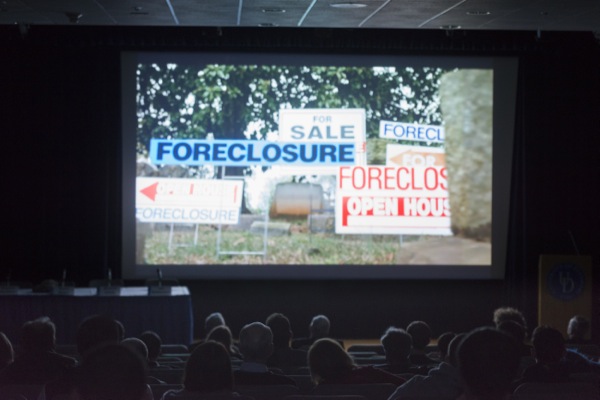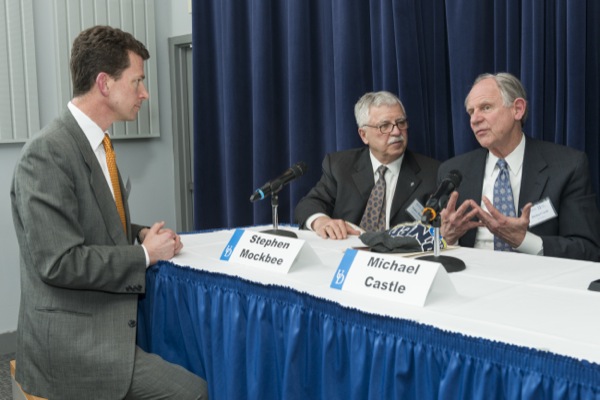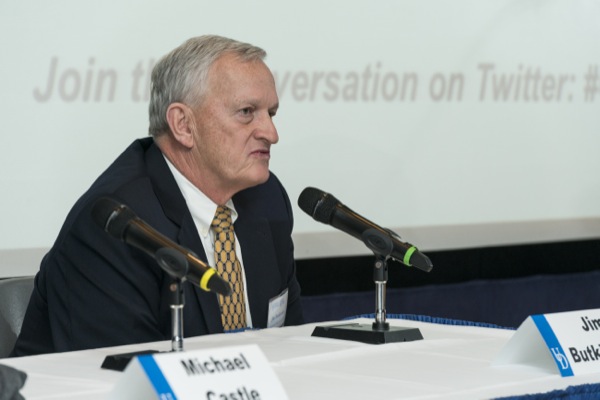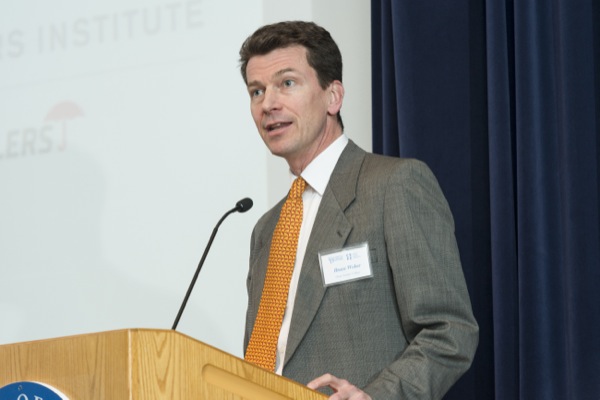


'Overdraft' screened
Panelists discuss nonpartisan documentary on debt crisis, implications
11:52 a.m., March 1, 2013--While America’s debt crisis has been a topic of concern and debate for several years, the nonpartisan documentary Overdraft takes a step back from bipartisan distractions and concentrates on examining the facts surrounding the deficit and resultant effects on the American public.
In a special screening and panel hosted by the Center for Economic Education and Entrepreneurship in the University of Delaware’s Alfred Lerner College of Business and Economics on Feb. 19, the documentary, produced by the Travelers Institute in collaboration with public television, addressed the $16 trillion national debt and possible solutions to bring America out of the crisis.
Campus Stories
From graduates, faculty
Doctoral hooding
The screening at UD was just one of many that Travelers has launched nationally at universities. The film, which can be seen in its entirety on YouTube, is meant to invite students and faculty to join the conversation about the debt crisis.
Joan Woodward, executive vice president of public policy and president of the Travelers Institute, said the documentary was meant to address some of the most important issues facing the country today, and as one of the largest insurance companies in the country, Travelers was eager to make the documentary and share it with audiences nationally.
“Travelers is a data driven company and this is reflected in nearly everything that we do,” Woodward said. “In that context our leadership team was tumbling through some of the long term economic data and some really structurally significant economic challenges came into focus. As a result Travelers decided to get involved.”
The film, through first-hand accounts of experts and those who have been directly affected by the national debt, brought up major topics surrounding the debt as well as areas that potentially need to be cut back in order to reduce the deficit. Topics covered ranged from entitlement programs, defense spending and tax reform to choices individuals and businesses must make in order to stay afloat.
Panel discussion
After the screening, Bruce Weber, dean of the Lerner College, initiated a discussion with panelists Michael N. Castle, former Delaware governor and Republican congressman; Stephen Mockbee, president and founder of Patriot Government Services Inc., and former president and CEO of Bancroft Construction; and James Butkiewicz, chair of the Department of Economics at UD.
Weber opened the discussion by addressing how the film compared the national debt to a family spending outside of its means. When Weber asked the panel if they thought it was a fair analogy, Castle said that though it might not be entirely accurate the comparison is significantly easier for the average person to comprehend.
“We do have excessive borrowing going on in this country and what was said here in the Overdraft documentary is basically correct,” said Castle. “It is clearly something neither political party in terms of the presidents or Congress has come to grips with and it needs to be addressed.”
Butkiewicz also considered the film’s analogy and explained that although sometimes it is necessary for the government or a family to acquire debt in order to continue functioning, there is cause for alarm when it appears relief from the debt will never occur. Butkiewicz said this is the condition the national deficit is in now.
He added that comparing the debt crisis to family spending overages is not the only thing to consider when questioning why the economy is failing.
“My outlook is even more dismal, being a dismal scientist, than you might have gotten from the documentary,” Butkiewicz said, noting that unfunded liabilities by state and local governments, low interest rates and the long run rate slow down are all other causes for concern.
In light of this outlook, Weber asked business founder Mockbee if he would ever consider starting a business in today’s economy.
Mockbee said if he did, one of the first things he would have to worry about is debt and pointed out that borrowing money from a bank would equate to making an investment in not just the company but the current state of the economy.
He wasn’t so sure a new company would be able to make enough equity to pay off such debt.
“I don’t know if I would start a company if I did not believe that the initial investments that were made would be able to give me a free and clear company over time,” said Mockbee.
The event closed with a question and answer session in which the panelists fielded questions from faculty, students and community members on topics ranging from issues with the current tax code and the need for more bipartisan compromise to reduced spending only once the economy has more fully recovered.
A video of the panel discussion is available on YouTube.
Article by Rachel Taylor
Photos by Evan Krape











